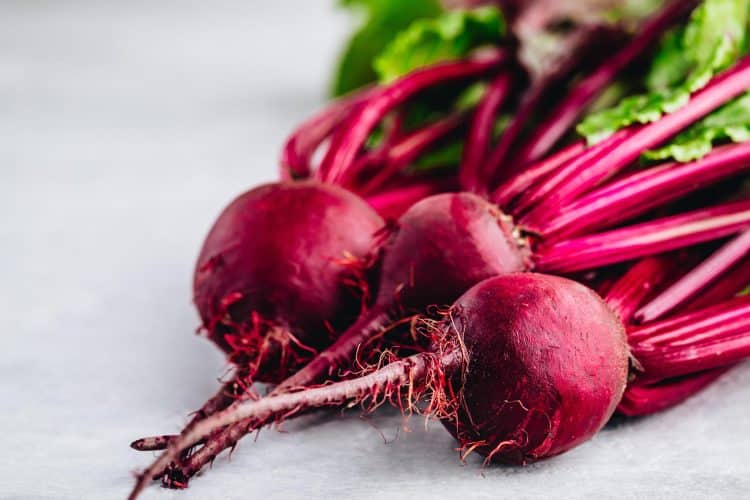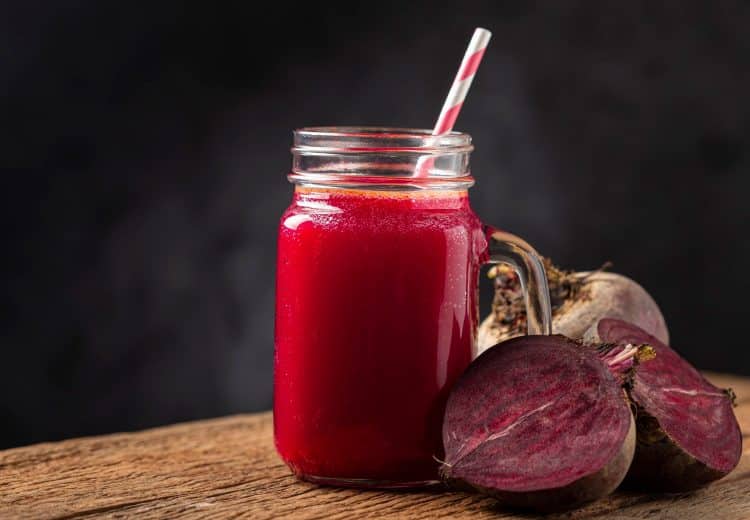Ever since Arnold Schwarzenegger famously described its joys in Pumping Iron (1977), gymgoers have been striving for ‘the pump.’ It’s the feeling you get when your muscles are blown up with blood and engorged with nutrients. If you’ve ever experienced it, you no doubt agree with Arnold that it ‘feels fantastic.’
To achieve an awesome pump, you’ve got to enlarge your blood vessels so more blood can flow to your working muscles. Recently, beetroot juice has gained popularity as a safe, natural way to do it.
In this article, we explore how effective beets are as a pre-workout food and how you can best use them to get pumped up on the gym floor.
Understanding the Pump: Your Secret Weapon for Muscle Growth
The “pump” is that temporary muscle swelling during and after exercise, resulting from increased blood flow and cellular fluid accumulation. It’s not just about aesthetics – the pump plays a crucial role in muscle growth and recovery.
- Delivers oxygen and nutrients crucial for muscle growth
- Enhances removal of waste products like lactic acid
- Stimulates muscle protein synthesis
- Creates a favorable environment for muscle hypertrophy
During a workout, muscles need higher blood flow to receive the necessary oxygen and nutrients for growth. The muscles’ blood vessels enlarge due to this increased blood flow, temporarily increasing muscle size.
The increased blood flow can also result in a temporary boost in muscle size and strength, leading to that satisfying feeling of tightness and fullness.
The key to maximizing your pump? Nitric oxide – a naturally produced gas that dilates blood vessels, allowing for greater blood flow to your hard-working muscles.
Nitric Oxide: The Pump-Boosting Powerhouse
Nitric oxide (NO) is a colorless, odorless gas that acts as a crucial signaling molecule in your body. It’s produced by various cells, including endothelial cells, neuron cells, and immune cells. Here’s why NO is a game-changer for your workouts:
- Enhances vasodilation, relaxing blood vessels
- Improves blood flow to working muscles
- Increases oxygen and nutrient delivery
- Accelerates waste product removal
- Supports overall cardiovascular health
Vasodilation, the process of relaxing blood vessels, is enhanced by nitric oxide (NO). Endothelial cells that line the blood vessels release NO, which diffuses into nearby smooth muscle cells and relaxes them, expanding the blood vessels and improving blood flow.
Beets: Nature’s Nitric Oxide Booster
Beets are a powerhouse of nitrates, which your body efficiently converts to nitric oxide. Here’s why beets are gaining popularity among fitness enthusiasts:
- High concentration of dietary nitrates
- Easy conversion to nitric oxide in the body
- Natural, whole food source of NO precursors
- Packed with additional nutrients and antioxidants
After consumption, beets’ nitrates are transformed from nitrites to nitric oxide in the body by bacteria in the mouth.
Additional Benefits of Beets for Athletes
Beets do more than increase your blood flow. Here are four other ways they can improve your workouts:
- Increased Endurance: Studies show that beetroot consumption can enhance exercise endurance and reduce oxygen demand during workouts. This improvement in endurance can lead to longer, more effective training sessions. [3]
- Natural Energy Boost: The natural sugars in beets provide quick, sustainable energy for intense training sessions. This can help reduce fatigue and improve overall performance. [4]
- Reduced Inflammation: Beets are rich in antioxidants and anti-inflammatory compounds, which may lead to less oxidative stress and inflammation. This can accelerate recovery and minimize post-exercise muscle soreness, allowing for more frequent and intense workouts.
- Improved Cardiovascular Health: The nitric oxide boost from beets can help lower blood pressure and enhance overall cardiovascular function. This improvement in cardiovascular health can contribute to better exercise capacity and overall fitness. [5]
Are Nitrates Safe for Consumption?
Nitrates are generally safe in the small amounts found in a balanced diet, but it’s important to be aware of potential risks associated with high concentrations. Nitrates can interact with certain bacteria in the body to form nitrites, which can then combine with other compounds to create nitrosamines. Some nitrosamines have been found to be carcinogenic in animal studies.
Consuming large amounts of nitrate-containing foods or processed meats with added nitrates may increase the risk of certain health issues, such as cancer, digestive problems, and cardiovascular disease. However, the nitrates found naturally in vegetables like beets are generally considered safe and beneficial when consumed as part of a balanced diet.
Your Pre-Workout Secret Weapon
Beetroot juice has gained traction as a potent pre-workout supplement. Here’s how to incorporate it into your training regimen:
- Optimal Dosage: Aim for 2 cups (500 ml) of beetroot juice daily for a few days leading up to your workout. This dosage has been shown in studies to boost nitric oxide levels and enhance exercise performance.
- Timing: Consume beetroot juice 1-2 hours before exercise to allow for optimal nitric oxide production. This timing ensures that your body has sufficient time to convert the nitrates into nitric oxide.
- Consistency: For best results, maintain regular beetroot juice intake as part of your pre-workout routine. Consistency is key in maximizing the benefits of beetroot juice.
- Individual Response: Experiment with dosages to find what works best for your body and training style. Some athletes may find they need more or less beetroot juice to experience optimal benefits.
It’s worth noting that the effects of beetroot juice can vary depending on the individual, the specific brand and concentration of the juice, and other factors. If you’re considering using beetroot juice as a pre-workout supplement, it’s advisable to start with a smaller dose and gradually increase it while monitoring your body’s response.
Maximizing Beet Benefits for Your Workouts
Can beetroot juice help build muscle?
Yes, beetroot juice can support muscle growth through several mechanisms:
- Enhanced blood flow and oxygen delivery to muscles, which can improve muscle performance during workouts
- Improved exercise performance and reduced fatigue, allowing for more intense and productive training sessions
- Anti-inflammatory properties supporting muscle recovery, which can lead to faster muscle repair and growth
- Natural energy boost for more intense training sessions, potentially leading to greater muscle stimulation
Additionally, the natural sugars in beetroot juice can serve as a quick energy source during workouts, potentially allowing for more strenuous exercise and greater muscle stimulation.
What’s the ideal timing for beetroot juice consumption?
For optimal results:
- Consume 1-2 hours before your workout to allow time for nitric oxide production
- Consider daily intake for a few days leading up to intense training or competition to build up nitrate levels in your system
- Experiment with timing to find your personal sweet spot for performance enhancement
Some studies have shown that taking beetroot juice for several days before an event or intense workout may be beneficial for improving exercise performance.
Are there any risks associated with beetroot juice consumption?
While generally safe, be aware of:
- Potential for temporary pink urine or stool (harmless side effect)
- Possible interactions with certain medications (consult your healthcare provider if you’re on any medications)
- Moderation is key – excessive intake may lead to unwanted effects
It’s also important to note that while beetroot juice is generally safe, individuals with certain health conditions should consult with a healthcare professional before adding it to their diet, especially in large amounts.
Related: Elevate Your Workouts with Top-Tier Pre-Workouts
Discover our comprehensive guides on pre-workout supplements to further optimize your training:
- Best Pre-Workouts for Weight Loss
- Best Pre-Workouts Without Creatine
- Best Tasting Pre-Workout Supplements
- Strongest Pre Workout Supplements
- Best All-Natural Pre-Workouts
- Best Caffeine-Free Pre-Workout Supplements
Unleash the Power of Beets in Your Training
Beetroot juice has emerged as a potent, natural pre-workout supplement, offering a myriad of benefits for athletes and fitness enthusiasts:
- Enhanced nitric oxide production for superior pumps
- Improved endurance and reduced fatigue
- Accelerated recovery and reduced muscle soreness
- Natural energy boost for more intense workouts
To harness the power of beets, start with 2 cups (500 ml) of beetroot juice about an hour before your workout. Experiment with timing and dosage to find your optimal performance-enhancing routine.
Remember, consistency is key. Incorporate beetroot juice regularly into your pre-workout regimen to experience its full potential in elevating your training sessions and achieving your fitness goals. As with any dietary supplement, it’s always a good idea to consult with a healthcare professional or a registered dietitian before making significant changes to your diet or supplement routine.
References
Fitness Volt is committed to providing our readers with science-based information. We use only credible and peer-reviewed sources to support the information we share in our articles.
- Maiorana A, O’Driscoll G, Taylor R, Green D. Exercise and the nitric oxide vasodilator system. Sports Med. 2003;33(14):1013-35. doi: 10.2165/00007256-200333140-00001. PMID: 14599231.
- Zamani H, de Joode MEJR, Hossein IJ, Henckens NFT, Guggeis MA, Berends JE, de Kok TMCM, van Breda SGJ. The benefits and risks of beetroot juice consumption: a systematic review. Crit Rev Food Sci Nutr. 2021;61(5):788-804. doi: 10.1080/10408398.2020.1746629. Epub 2020 Apr 15. PMID: 32292042.
- Wylie LJ, et al. Dietary nitrate supplementation improves team sport-specific intense intermittent exercise performance. Eur J Appl Physiol. 2013 Jul;113(7):1673-84.
- Lansley KE, et al. Dietary nitrate supplementation reduces the O2 cost of walking and running: a placebo-controlled study. J Appl Physiol (1985). 2011 Mar;110(3):591-600.
- Kelly J, et al. Effects of short-term dietary nitrate supplementation on blood pressure, O2 uptake kinetics, and muscle and cognitive function in older adults. Am J Physiol
Tip: If you're signed in to Google, tap Follow.












